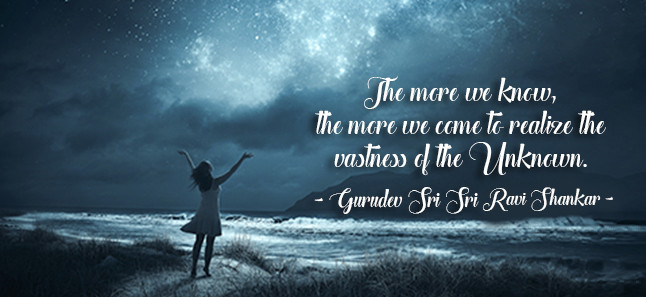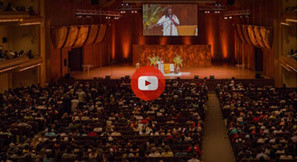
One of the more recent and contemporary poets from Karnataka has composed a beautiful poem about Surrender, and whom should one seek refuge in. The verse says “Become a Sharanagati and take refuge in the fact that life is a great and deep secret”.
The more we come to know about life, we find that we do not know so much more about life. What increases is our realization that there is still so much we do not know at all. The more we know, the more we come to realize the vastness of the Unknown. We then realize we have not learnt much about life.
For example, for an infant, his world is small and limited. He does not know anything about the outside world. He just recognizes his toys, his parents and his few friends. That is all that his world is limited to. As he grows, he comes to understand more and more about the vast world outside, and then he realizes that there is so much more to be known and understood. So life is a great mystery; it is a secret. No one has been able to comprehend life completely, nor can anyone actually do so. Yet we should surrender ourselves to this very fact (about the vastness and mystery of life).
What should you surrender to? Take refuge in the Intellect. You do not know anything about your intellect. The intellect is deep and profound. Since time immemorial, we in India have given prime importance to the intellect which is the seat of logic and rationality. That is why in the Gayatri Mantra we pray that - may the Divine inspire and illumine everyone’s intellect.
See, one way of surrender is to surrender after being defeated. But when one gets amazed by seeing a mystery, an unfathomable secret; then the surrender that dawns out of that sense of wonder and amazement is a different kind of surrender. That surrender happens by surrender to the intellect. When you see or meet any great scientist, you will see that they always have an underlying sense of surrender and humility. They say, “This world is an amazing mystery”.
When one gets amazed by seeing a mystery, an unfathomable secret; then the surrender that dawns out of that sense of wonder and amazement is a different kind of surrender.
A great scientist had come to the Ashram and he told me, “Gurudev, I know that none of the objects has any actual existence as such. For example, I know that this chair does not really exist!”
Why did he say this? See, he is a Quantum Physicist. So when seen from the perspective of Quantum Physics, the object does not really exist. The scientist said that matter actually does not exist.
He said “Gurudev, when I say all this, people misunderstand me and think I am talking about the principles of Buddhism (referring to one of the core beliefs that everything is nothing). But I am only speaking from the experience of my life and what I have come to understand through Science”.
This is the surrender of the intellect. This is a different kind. The surrender that comes from acknowledging one’s weakness and defeat is different; while the surrender that dawns from within because of wonder and amazement is very different.
When can you feel that your life is like a fully blossomed fragrant flower? That can happen when there are no more cravings and aversions within, and there is no sense of separateness. When you feel a sense of total belongingness, and you exude love and compassion towards everyone and everything in Creation, when you become so natural and simple, then you feel life has blossomed. When you have cravings and aversions towards someone or something, your mind feels hardened like a stone. Life almost feels like a living hell. Life feels hard and miserable. It does not feel like a soft beautiful flower spreading its fragrance everywhere. So when you make efforts to transform your life into a fully blossomed flower, then take surrender in that noble effort as well, whether those efforts succeed or not.
You must have seen that people become very grim and serious when they are sad or miserable. They become so quiet and are not able to express their sorrow to someone else. So when they cannot express their feelings they grow very quiet and serious.
But this kind of silence is not born of deep peace and contentment from within. The silence that dawns when we become totally peaceful and serene from the inside is deep, beautiful and very comforting. So much joy springs from within with that silence, and instead of grim seriousness, a sense of dignified peace blossoms from oneself.
In that state, there is no more fear. There is no sense of separateness with anyone; instead total belongingness arises. In such a state one does not need any false pretence, one becomes so natural. The dignified calm and quiet solemnest that one acquires in such a state is of a different quality altogether. When you realize that the Creator of the Creation resides within oneself, then a great peace and sense of contentment dawns inside. So the verse says – take refuge in that deep sense of peacefulness.
When you realize that the Creator of the Creation resides within oneself, then a great peace and sense of contentment dawns inside. Take refuge in that deep sense of peacefulness.
Just as there is an Atma (soul) residing within every living being, so also all souls collectively become the Vishwatma (the Universal Soul or Universal Spirit). The verse says, "Take surrender and refuge in that vast infinite Vishwatma which pervades all of Creation". The end the verse says, “O my sweet foolish one! Why then do you not seek refuge and surrender to this?”
There is a poem in which the poet says “Everyone asks this question – ‘Who is God?’ The atheists have become tired of asking this question since the ages. So they tend to say that God does not exist”.
But our people have given a beautiful answer to this question by giving the definition of God. Who is God? God is Satchidananda. Now, an atheist will argue saying that there is no such thing as the truth. Well, then what he is saying is also not the truth! (Laughter) If someone claims that there is no such thing as the truth, then can what he is saying be true? Sri Adi Shankaracharya Ji expounded upon a very simple fact and made India what it is today. It is a great secret. In those days, following the principles of Lord Buddha, the Buddhist monks used to think “I searched for the soul everywhere and yet I could not find it. Hence the soul does not exist”. This is called Anatmavaad (meaning refuting the existence of the Soul). So, because they searched a lot for the soul everywhere and could not find it, they concluded that the soul does not really exist.
But just see how intelligent and profound Adi Shankaracharya Ji was. When he heard this, he said, “Oh! So you did not find the soul, is it? Tell me, who was it that went searching?” One of the monks replied, “I searched for the soul”.
To this Adi Shankaracharya Ji said, “That is the Soul, none other!” The ‘one’ who went about in search, the ‘one’ (who claimed) he could not find the Soul – that is the Soul itself! By resolving this question, and expounding the simple yet most profound truth, Adi Shankaracharya Ji heralded the revival of Vedic knowledge and Advaita and took India back to the roots, back to the Vedic tradition of pure knowledge.
Until Adi Shankaracharya Ji came, many people believed in Lord Buddha and His principles. Lord Buddha was called as Tathagata (one who has realized the ultimate principle, the ultimate reality). When Adi Shankaracharya Ji came, he said, “Yes, it is true indeed that everything is empty, everything is nothing. But this life is bliss and joy. Life is not misery”.
See, Lord Buddha said that life is misery and difficulty. Adi Shankaracharya Ji said, “Life is Joy”. Lord Buddha said “Everything is emptiness; it is nothing”. Adi Shankaracharya Ji said “Everything is fullness (of Consciousness)”.
Lord Buddha spoke of emptiness; Adi Shankaracharya Ji spoke about fullness. Lord Buddha spoke of Shuunyata (nothingness or not real), but Adi Shankaracharya Ji spoke about Purnata (fullness or totality of Consciousness everywhere). Knowledge is the beautiful confluence and combination of emptiness and fullness. This is the glory of India’s spiritual knowledge and India’s tradition.
Adi Shankaracharya Ji said, “Yes, it is correct that everything is nothing, it is all emptiness. It is because the totality of Fullness cannot be if it does not contain or encompass Nothingness as well”.
In emptiness or nothingness you cannot say there is fullness. But fullness becomes total and complete only when it includes and encompasses emptiness as well. So Adi Shankaracharya Ji very skilfully convinced every one of his philosophy (of Fullness) along with accepting the principle of Emptiness (rather than rejecting it). So here you see the greatest Truth expressed in the most wise and clever way.










